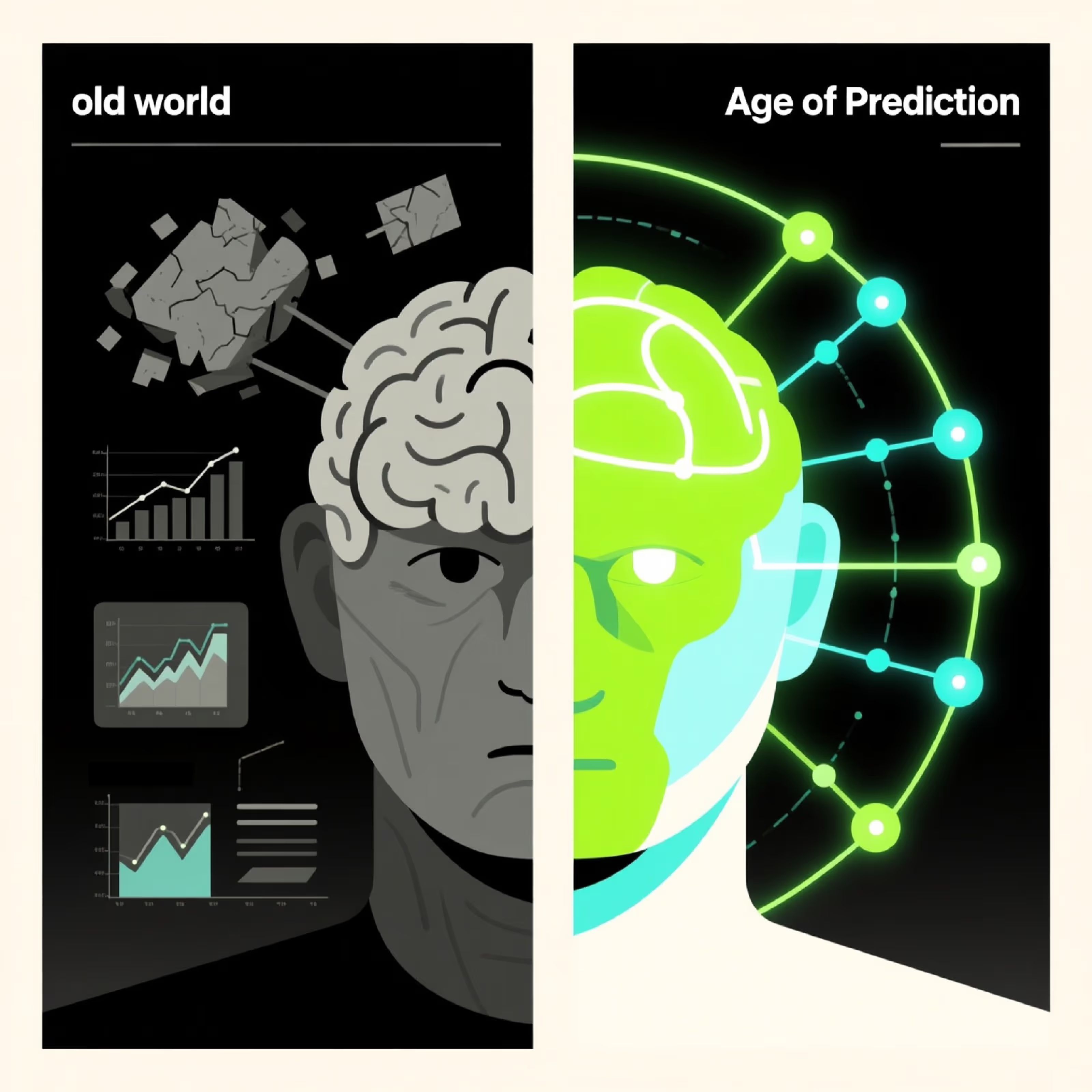The Age of Prediction: When Seeing the Future Becomes the Business

tl;dr - The turmoil we saw/are seeing in the tech and politics is not an accident. Pervasive uncertainty is the reality. Therefore, prediction is at the core of the value creation going forward.
Is Lovable going to survive six months? Is GPT-7 going to transform the world? Are we all heading toward some existential crisis in 2027?
These are the kinds of questions millions of us find ourselves asking. But the real question is: why is this happening, why now, and what do we do about it?
It feels like our old mental models — how the world works, how value is created, and how companies are built — no longer hold.
Finally, there is one plausible explanation that ties the past to what is unfolding now, from Alex Danco ’s article "Prediction: The Successor to Postmodernism" on a16z subtack.
From Postmodernism to Prediction
(my shorthand for a complex 70-year evolution; please don't get mad)
Our ideas about how organizations should be built, what experiences we seek, and what progress looks like were shaped in the 1940s. That period was called Postmodernism - a reaction to Modernism, which had placed too much faith in progress, reason, and grand narratives that claimed to explain history and human experience.
Postmodernism questioned the idea of objective truth and universal meaning, emphasizing instead the role of language, power, and cultural context in shaping knowledge. Those ideas deeply influenced how the business world evolved - from corporate structures to how brands told their stories.
It made us comfortable with fragmentation, interpretation, and narrative. Companies like Apple and Nike built meaning not through their products but through the stories they told - "Think Different" or "Just Do It." You did not buy the thing; you bought what it meant.
That stance worked in a stable world, where production and meaning changed slowly, and institutions provided continuity. But as technology accelerated, it became clear that this comfort with narrative was not enough. Postmodernism, in practice, often devolved into a kind of apathy - an "anything goes" attitude. It could not offer guidance in a world that was changing in real time.
There is a search for a new framework to help explain what we see/do, and organize our lives around.
Today, uncertainty sits at the core of how we live and work. And in that uncertainty, value accrues to the entity — a person, company, or product — that can predict and act on prediction.
When this activity moves from a simple one time task to pervasive activity, we see a new world. Hence prediction as a successor to Post-modernism. We know that purists have quibbled with this framing and it is imperfect but very useful.
Think of a “refrigerator predictor” - a person who spots how our needs for cooling are changing before manufacturers do. He tells stories, shapes expectations, and rallies a community long before a new model exists. The act of predicting becomes more valuable than building.
That’s the essence of the new economy - anticipation beats execution.
Independently, few other folks I have been following have directly or indirectly spoken about it. Johannes Bhakdi articulated it as "Reality Engineering". Rajesh Iyer spoke about "Fabers" - modern craftsmen who would shape the future. Ethan Mollick talked about future human role in "deciding what’s worth doing, not just what can be done". My collaborator Rajesh Parikh spoke about insights from continuous exploration driving product development.
What I like about Alex's framing is its ability to explain the past - not just the future - and observations across politics (Trump), technology (Lovable), and culture (memes).
The Business of Prediction
There are many ways this new predictive economy shows up:
- Bet on the prediction - like investors and founders do.
- Sell your prediction - as research, advice, or a service.
- Livestream your prediction - through commentary, podcasts, or newsletters.
- Package predictions - into contracts or tools others can build on.
- Teach prediction - explaining the thinking and methods behind it.
The new advantage comes from seeing around corners — from sensing what is coming and positioning early.
What This Means
For Business: The world will be hyper-competitive and volatile. Assume frequent and deep change. The shelf life of products and companies will be short. The best organizations will build off live prediction - anticipating where the market, the regulator, and the customer are going next.
For Individuals: Careers will be dopamine-heavy. The shelf life of ideas, skills, and even employment contracts will shrink. There will be no boring days - only continuous opportunities and challenges. The ones who thrive will predict the value of their work, the trajectory of their company, and act accordingly - whether that means learning a new skill or moving to a new domain.
Carver Backstory
I have wrestled with these questions for years. In building Scribble, I have seen hundreds of products and companies come and go. Over 30 billion dollars in value has evaporated in just five years. I was often surprised by how fast markets shifted.
That realization about the changed nature of reality led to Carver, though the underlying ideas were not fully formed then.
Carver today is mostly focused on the ability to observe and analyze. In future, we will predict regulatory change before it lands, so the customers can prepare, adapt, and act with confidence.
In a world defined by uncertainty, prediction isn’t a luxury - it’s the way to compete and win.
Also, read @tradefox ai @tradefoxintern 's summary of Alex's article.
Carver Agents provide realtime regulatory risk intelligence for finance. If you need ability to observe, understand, and act on regulatory changes ahead of competition, let us know.